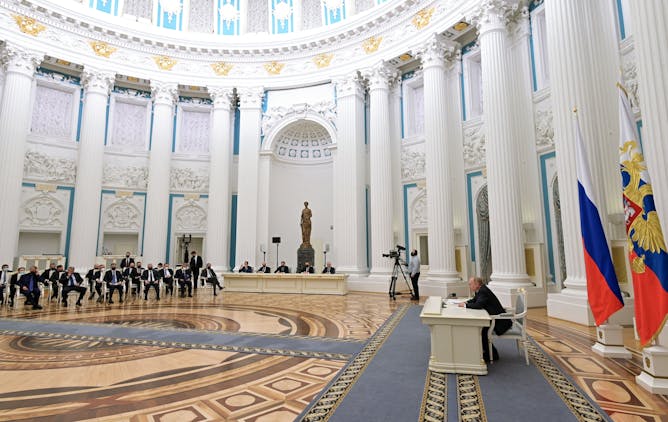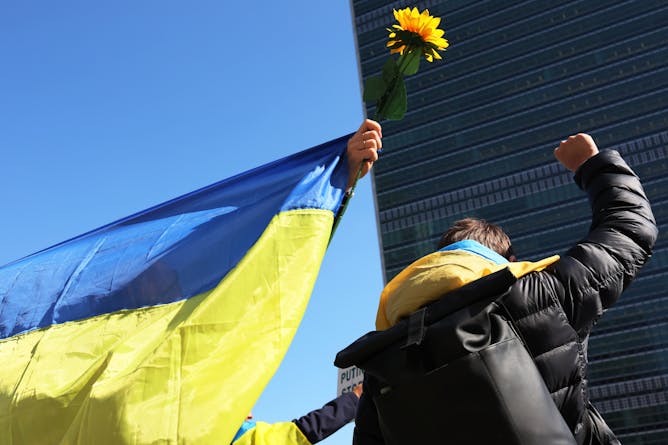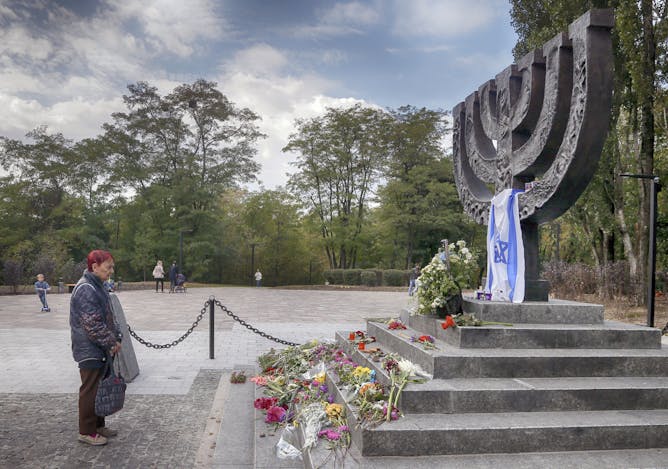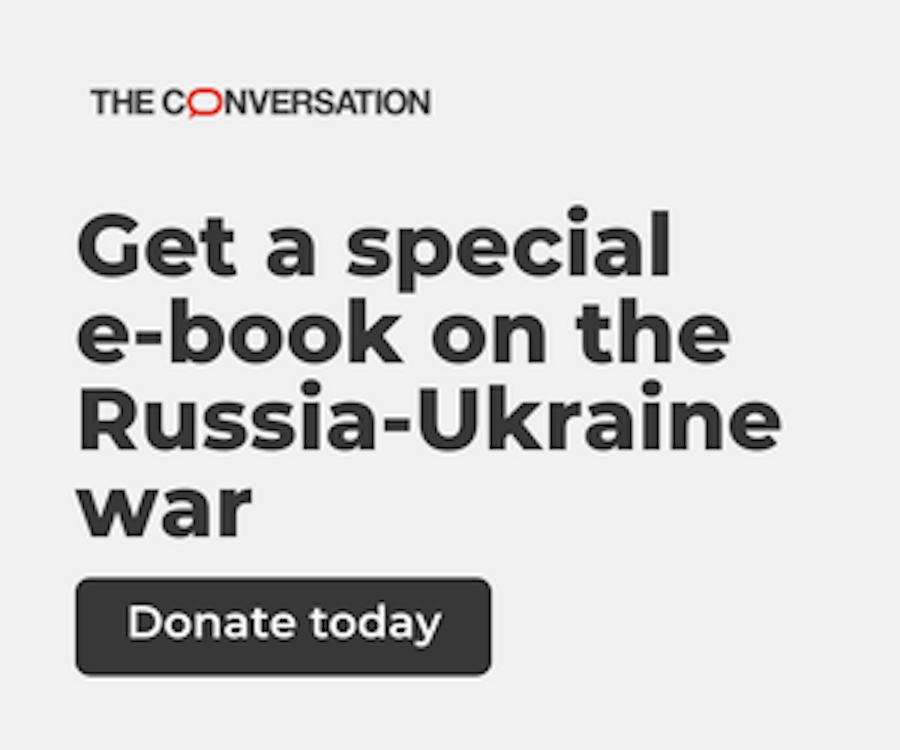|
|
|
|
If you are anything like me, you’ve spent a lot of your time these past two weeks glued to the TV, your laptop and your phone, keeping up with the war in Ukraine. You know that the reporting from Ukraine has been amazing – reporters on the ground in the middle of a war who apparently need no sleep and have no fear. The people of Ukraine are the face of this war; reporters are its eyes and ears.
The Conversation has been adding to the essential coverage of this war by asking scholars to help explain everything from the history of Ukraine to the political, economic and even medical aspects of the conflict. Our stories are often of the “let’s-answer-that-question-you’ve-been-wondering-about” sort.
For instance: We all keep hearing about Russian oligarchs and their role supporting Putin. But who are these oligarchs? How’d they make their money? What is their relationship to Putin, exactly? University of South Carolina scholar Stanislav Markus answers all those questions, and more, including whether Putin really needs the oligarchs’ support to stay in office.
Likewise, we’ve looked into the role of the U.N. in this crisis and tried to answer whether it really has any power to stop Putin’s murderous aggression – or any other leader bent on unjustified war. Shelley Inglis of the University of Dayton, a former U.N. staffer, has a straightforward answer in her story: While she still believes the U.N. is “essential to humanity’s survival … it is difficult to overcome critiques that the U.N. is often just talk when
diplomacy fails to avert an unjustified war of this scale.”
There are lots more stories below, from an explainer about the Ukraine military to a guide for how to give smartly and responsibly to Ukrainians. I won’t say enjoy your reading, but I will say I hope you learn something useful from
it.
|

|
Naomi Schalit
Senior Editor, Politics + Society
|
|

Putin has kept most oligarchs at a distance – literally and figuratively.
Alexey Nikolsky/Sputnik/AFP via Getty Images
Stanislav Markus, University of South Carolina
An expert on oligarchs explains how they came to be Russia’s richest and most powerful people and scrutinizes their relationship with Putin.
|

People gather outside the U.N. headquarters in New York City to protest the war in Ukraine on March 2, 2022.
Michael M. Santiago/Getty Images
Shelley Inglis, University of Dayton
Russia holds veto power on the UN Security Council, blocking any action to interfere in the Ukraine war. This is unlikely to change soon – but the UN still has other options for engagement.
|

A woman pays homage at the memorial to victims of the 1941 Nazi massacre of Jews in Babi Yar in Kyiv, Ukraine.
AP Photo/Efrem Lukatsky
Jeffrey Veidlinger, University of Michigan
Over two days in September 1941, more than 33,000 Jews were murdered by Nazi forces and their Ukrainian collaborators in Babi Yar.
|
|
|
-
Liam Collins, United States Military Academy West Point
Though the Russian army dwarfs the strength of the Ukrainian army, the underdog has managed to resist during the early days of the Russian invasion. Military reforms are part of the reason.
-
Tazreena Sajjad, American University School of International Service
The welcome mat for refugees fleeing war-torn Ukraine stands in stark contrast to recent anti-immigrant policies targeting those from the Middle East, Latin America, Africa and Asia.
-
Jessica Maddox, University of Alabama
How do a country and its citizens deal with the trauma of a deadly invasion by an enemy? Memes, cats and TikToks are emerging – most recently in the Ukraine war – as a way to cope with tragedy.
-
Najmedin Meshkati, University of Southern California
The world held its collective breath as Russian troops battled Ukrainian forces at the Zaporizhzhia nuclear power plant. The battle is over and no radiation escaped, but the danger is far from over.
-
Miles A. Pomper, Middlebury
Russia’s invasion of Ukraine and Vladimir Putin’s nuclear threats have the world on edge, but so far, long-standing arms control measures have helped keep the situation from getting out of control.
-
Jose J. Padilla, Old Dominion University; Erika Frydenlund, Old Dominion University
More than 2 million Ukrainians have fled the country since the Russian invasion. The EU has welcomed the refugees, but research shows that host communities may tire of the newcomers.
-
Sam Hunter, University of Nebraska Omaha; Gina Scott Ligon, University of Nebraska Omaha
The current conflict in Ukraine has three key leaders, each of whom uses a different approach to the crisis.
-
Daniel E. Walters, Penn State; William M. Manson, Penn State
Some investors want publicly traded companies to disclose their full climate impact, including emissions from their supply chains and product use.
-
Brian Grodsky, University of Maryland, Baltimore County
Sanctions follow a ‘punishment logic,’ which often hurts the wrong people – and will likely weaken an already beleaguered Russian opposition.
-
Elizabeth Cullen Dunn, Indiana University
The Ukrainian crisis is probably the biggest crowdsourced humanitarian aid operation ever undertaken.
-
Douglas Schuler, Jones Graduate School of Business at Rice University; Laura Marie Edinger-Schons, University of Mannheim
Over 300 companies so far have closed stores, reassigned staff or halted sales in Russia in the two weeks since the invasion began.
-
Michael J. Socolow, University of Maine
Public scorn in response to a news story about how to cope with stressful news ignores a fact: The news can take a mental and psychological toll on a person.
-
Beth Gazley, Indiana University
Give with your head, not just your heart, advises a scholar who has studied donations made after disasters and other crises.
-
Henry L. Chambers Jr., University of Richmond
Justices declined GOP requests to block court-approved congressional maps in North Carolina and Pennsylvania. But justices punted a bigger question over the role of courts until after the midterm elections.
|
|
|
Like this newsletter? You might be interested in our other weekly emails: Enjoy reading The
Conversation? Share us with your three closest friends:
|
| |
| |
| |
| |

|
| |
| |
| |
| |
| |
| |
|
|
|
|
|
|
|